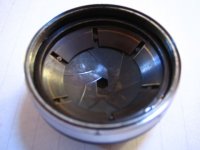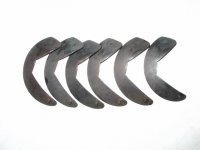tobias
Member
Hello,
as a sideline to a thread i posted about a IIIa and Xenon 50/1,5 which i picked up a couple of weeks ago (see here), I plea for an inside hand.

My intention was to clean the glass of the Xenon, and now i am having some problems with the aperture blades. It was not my intention to take the aperture apart in the first place, but i also did not expect the same retaining screws to connect two rings.
it tightens up too much when i screw the front group in, which is frustrating, and it makes me assume that i have something sitting wrong, as it moved freely before i took the lens apart. also, for some reason, the blades seem to have to be pulled and pushed, and i can see them flexing, when i operate them, which again is not good.
i thought this was the solution: to lay them out, and follow the order of the wear patterns on the bottoms of the blades, then insert them into the housing in the order from left to right. but it is still not happy.
yup, cleaned them with zippo fluid, so they should be clean as can be.
Has anyone taken one of these apart, or do any of you have any clue as to what might be nagging me this time?
many thanks,
T+
as a sideline to a thread i posted about a IIIa and Xenon 50/1,5 which i picked up a couple of weeks ago (see here), I plea for an inside hand.
My intention was to clean the glass of the Xenon, and now i am having some problems with the aperture blades. It was not my intention to take the aperture apart in the first place, but i also did not expect the same retaining screws to connect two rings.
it tightens up too much when i screw the front group in, which is frustrating, and it makes me assume that i have something sitting wrong, as it moved freely before i took the lens apart. also, for some reason, the blades seem to have to be pulled and pushed, and i can see them flexing, when i operate them, which again is not good.
i thought this was the solution: to lay them out, and follow the order of the wear patterns on the bottoms of the blades, then insert them into the housing in the order from left to right. but it is still not happy.
yup, cleaned them with zippo fluid, so they should be clean as can be.
Has anyone taken one of these apart, or do any of you have any clue as to what might be nagging me this time?
many thanks,
T+



